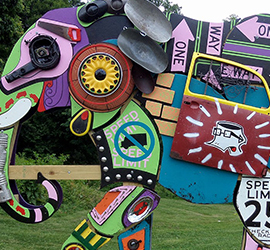When Will I Know? (1 of 2)
There are times when I ask myself… “When will I know? Will I ever?”
Will I know when it is time to… Stop taking those long hikes/walks alone? Stop driving? Ask for help because I get confused? Ask for assistance because I keep forgetting to take my medication? I have been asking these questions way before I ever began working in a retirement community.
Coordinating my first dementia study back in the early 1990s, and counseling patients and families in support groups, one cannot help thinking, “Is this going to be me? Is this me now?!”
The not so funny thing about clinical research, for me, is when you first make this a career, and after reading a few protocols and by the third study you start thinking, “OMG! I have this illness!” It is so easy to talk oneself into a condition. (I know a lot of nonmedical people who talk themselves into illnesses every day, and you know who you are.)
Soon after, a coworker comes over and says, “Do you want to get lunch?” You drop the protocol, forget that you thought you had the condition, and enjoy lunch with your colleague. The next day, your boss gives you a new study to manage, and your hypochondria kicks in again until it is time for lunch. It is repetitive, funny, and serious. Illnesses are nothing to laugh about.
So again, I ask… When will I know? Will I ever?
I know many who attempt to pretend a serious fall is nothing more than a trip, only finding out later when a hematoma develops that there is something more serious going on.
There is a mandate for classes that teach people how to fall, and why not to cover it up. It is rare, but a concussion can lead to something more serious, like swelling or a brain bleed. Working in medicine, I have learned a lot over the years, through schooling, seminars, direct care, observations of others, and commonsense, which many lack.
Logic tells me that a 24-observation period is not such a bad thing. Teaching people how to meditate during this interval might make them more inclined to be observed, because all too often people put up a fight. Sadly, the other side of this, people who are observed and are found to be okay will look at you and say, “Well, this was a waste of time!” But was it?! I do not think so. We have become a society of caring less, when we need to care more, more about ourselves, more about each other. That is what I try to do. I care about you, friend.
At this moment I am thinking about a friend who works with someone whom he thinks is showing signs of dementia. He’s saying this person has a problem remembering recent events, and can sometimes only recall them days later, gets confused about the order of things, is unable to concentrate and is unable to sit at their desk for long periods of time, is easily distracted, and the everyday tasks become a challenge because he is going behind his colleague and he sees the work not being done correctly or not done at all. The errors are real and constant, and for him – overwhelming.
He says this colleague purchases many note pads, uses them once, puts it down, and then when there is another meeting, does not grab the same note pad, but uses another, and another, and another... Sadly, this person never refers back to the original notes, thus confused about what the outcomes should be. Only after he commented to his colleague, did this change, and still the “note pad situation” begins again, and again.
He thought possibly this was not dementia, but a blood pressure issue. Why? Because when this person first began their job, he was taking his colleague’s blood pressure (for a month). No coworker should have to do that. He offered to do this because his colleague was struggling. The blood pressure readings were typically 200/140. After months of counseling the colleague, the medication needed was taken more seriously. Sadly, the drama remains because even though the colleague is purportedly taking the medication, what prompts the medication to be taken is the colleague makes statements of “I am nauseous. I do not feel well. I have a bad headache.” He then asks, “Did you take your medication.” The colleague says, “No!” Which tells my friend that this person can only remember to take their medication when prompted by a biological symptom.
Continue Reading: When Will I Know (2 of 2)































































































































































































































































